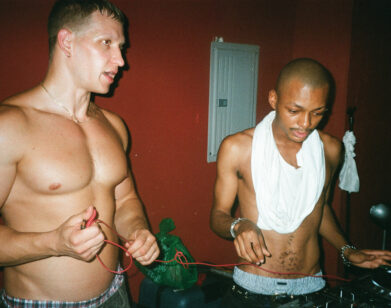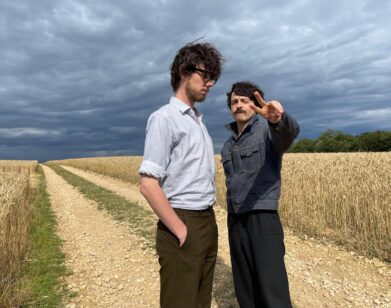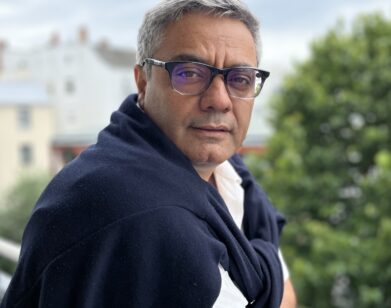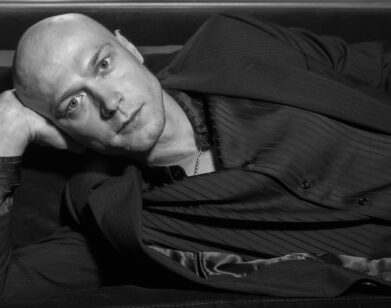“One Plus One Is Three”: Jonathan Majors and Matthew McConaughey on Finding Truth in Conflict
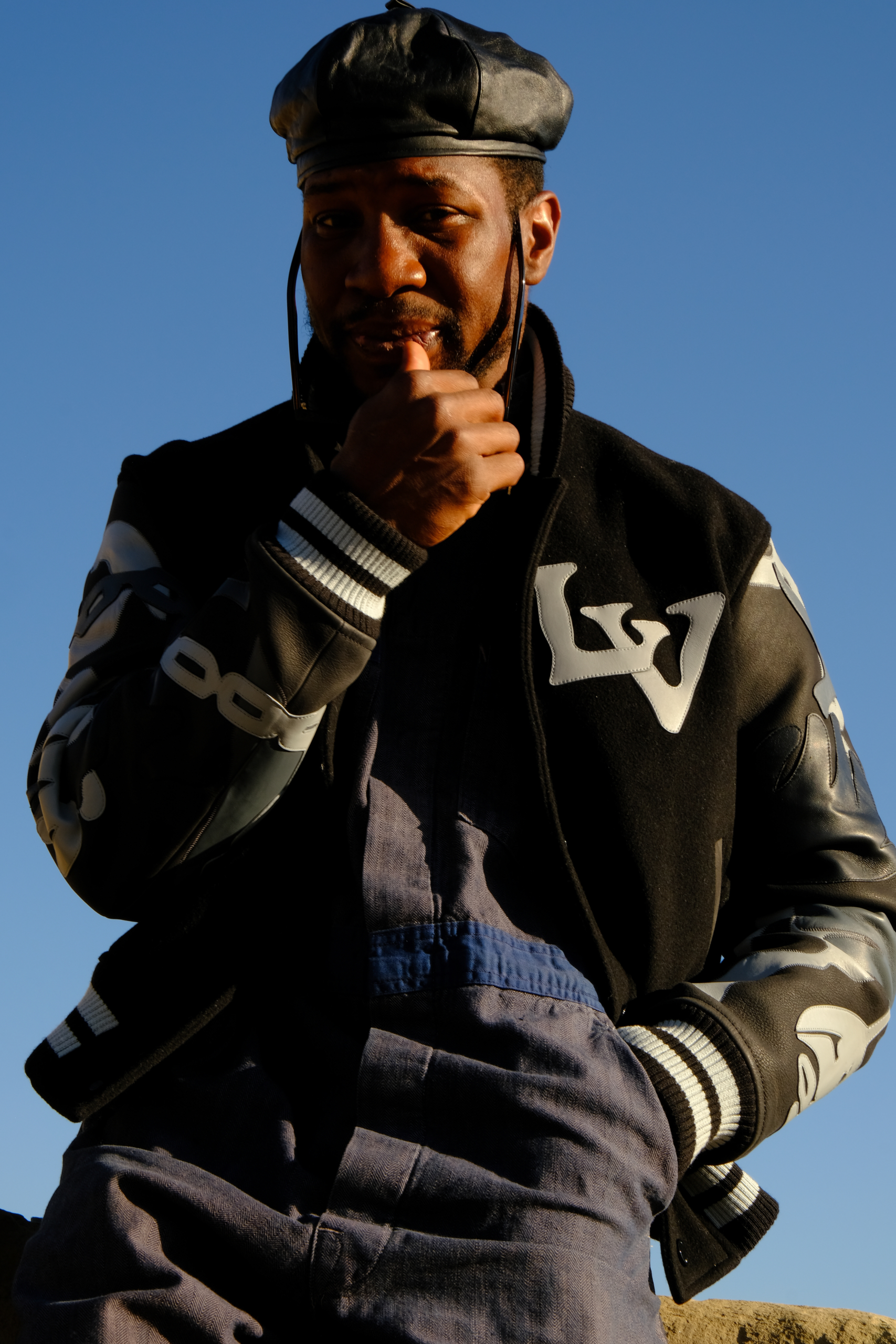
Jacket by LOUIS VUITTON MEN’S. Jumpsuit and Hat JONATHAN’S OWN.
Jonathan Majors was living in Harlem when he got word that Spike Lee wanted to meet him. Majors, who grew up on a Texas farm, still isn’t sure what caught the attention of one of the great American filmmakers. It could have been his early work as a drug dealer in the grimy gangster drama White Boy Rick, or as the activist Ken Jones in the docudrama When We Rise. But most likely, Lee was introduced to Majors through his breakout role in The Last Black Man in San Francisco, the 2019 Sundance hit about gentrification and loss. The performance, which announced Majors as a serious talent, was strange and elegiac, as if he’d let go of everything he learned at the Yale School of Drama to create something entirely his own. Whatever Lee saw, it was enough to skip the audition process and immediately cast the 30-year-old actor in Da 5 Bloods, his latest polemic about a group of Black Vietnam war vets who return to the jungle in search of treasure they buried decades ago. Majors plays David, the son of one of the titular Bloods (Delroy Lindo), who shows up unannounced to join them on their quest.
Later this summer, Majors will star in HBO’s Lovecraft Country, a Jordan Peele– and J.J. Abrams–produced genre mash-up that follows Majors’s character, Atticus Black, as he crosses Jim Crow America in search of his missing father. Majors recently reconnected with his White Boy Rick co-star Matthew McConaughey to talk about the specific resonance of these projects, both in his personal life and the world at large.
MATTHEW McCONAUGHEY: Mr. Majors. How you living?
JONATHAN MAJORS: I’m blessed, brother. I’m watching everything. Staying involved. How are you?
McCONAUGHEY: Relatively speaking, with the COVID stuff that’s going on, I’m in a blessed position. We’ve got my mom, who’s 88, here. We got the kids. We got a full pantry, so I’m in a good position with that. And then now, I’m looking at this news with George Floyd.
MAJORS: George Floyd.
McCONAUGHEY: Hopefully we can all find, all of us, a constructive way to make change out of this.
MAJORS: It’s deep, man, because I’ve been thinking on that, too. “Change” is such a hard word right now, and black folks don’t want to hear it. We don’t trust it. We didn’t change slavery, right? We abolished slavery. It wasn’t like, “Okay, let’s just make it look a different way.” I think we’ve tried that before with this system. It’s deep.
McCONAUGHEY: It’s real deep, and it’s intimidating to me to think about, or to try to voice an opinion on a larger level. I kind of instinctually go to, “I know we all got to do better.” We got to expect more of ourselves and more of each other, and we got to be more competent, and we got to build better people, man.
MAJORS: That’s right.
McCONAUGHEY: I hope we get out of this with real constructive change and not just the rhetorical, “Oh, well, this is a good idea.” We got to make some real change everywhere.
MAJORS: It’s going to take bravery. But from what I know about my brother McConaughey, you’re doing alright. You’re helping the cause. You stay involved. You got such a light about you. I remember when we were doing our press tour for White Boy Rick, I learned a lot watching you, and how you took me in, and how we got to talking. You were so generous with me. We say Black lives matter, but a lot of white folks don’t know Black folk. You just have a way of letting somebody else in. We need more of that.
McCONAUGHEY: In life and in work, especially here in America, there’s room for everybody to get blue ribbons.
MAJORS: I like that.
McCONAUGHEY: It doesn’t have to be, “I only win if you lose.” It doesn’t have to be that there’s only room for one person in so-called first place. You seem to be a very self-reliant, disciplined man, with a very strong personal constitution. You’re not a man that is for sale, and you also don’t solicit. Do you think that’s accurate?
MAJORS: It’s humbling to hear you say that. We’re both from Texas, and there’s a certain understanding down there about how people deal with each other. We got our issues, no doubt. I got a buddy named Brandon, who I boxed with for a long time, and I always think about him, or my daughter. If they look at something I’ve done, or they’ve seen me in the world and they don’t recognize me, then I’ve done something wrong. A tree never tries to be anything other than a tree. I’m just trying to be me, but I’ve got to bend and shape. I’m looking at a tree now in the backyard that’s bent over the house. That happened with time. It’s got to do that to survive. It does that, but it remains a tree. And the Lord and mentors and friends continue to water me. And so, it would be a disservice to them to alter who I am and my belief system for fame and money and notoriety. You can’t take that to the bank. That check will bounce.
McCONAUGHEY: Yes, sir. You’re touching on a really important thing. You just listed a long line of things you represent. That’s your lineage, where you came from. That’s building who you are, to where you’re going. And as you said, you’ll bend along the way. You’ll recalibrate. But you’re still a tree. You’re still Jonathan Majors. The only thing that doesn’t change are the roots. Let’s talk about how empowering that is, because sometimes in life we hear something like that, and we’re like, “If I’m representing all these other things, then I’m not doing enough for me.” But the truth is, you’re doing more for you. You’re making a very selfish choice to say, “All I can be is me.” But that selfish choice is actually the most selfless choice.
MAJORS: Speak, Matt!
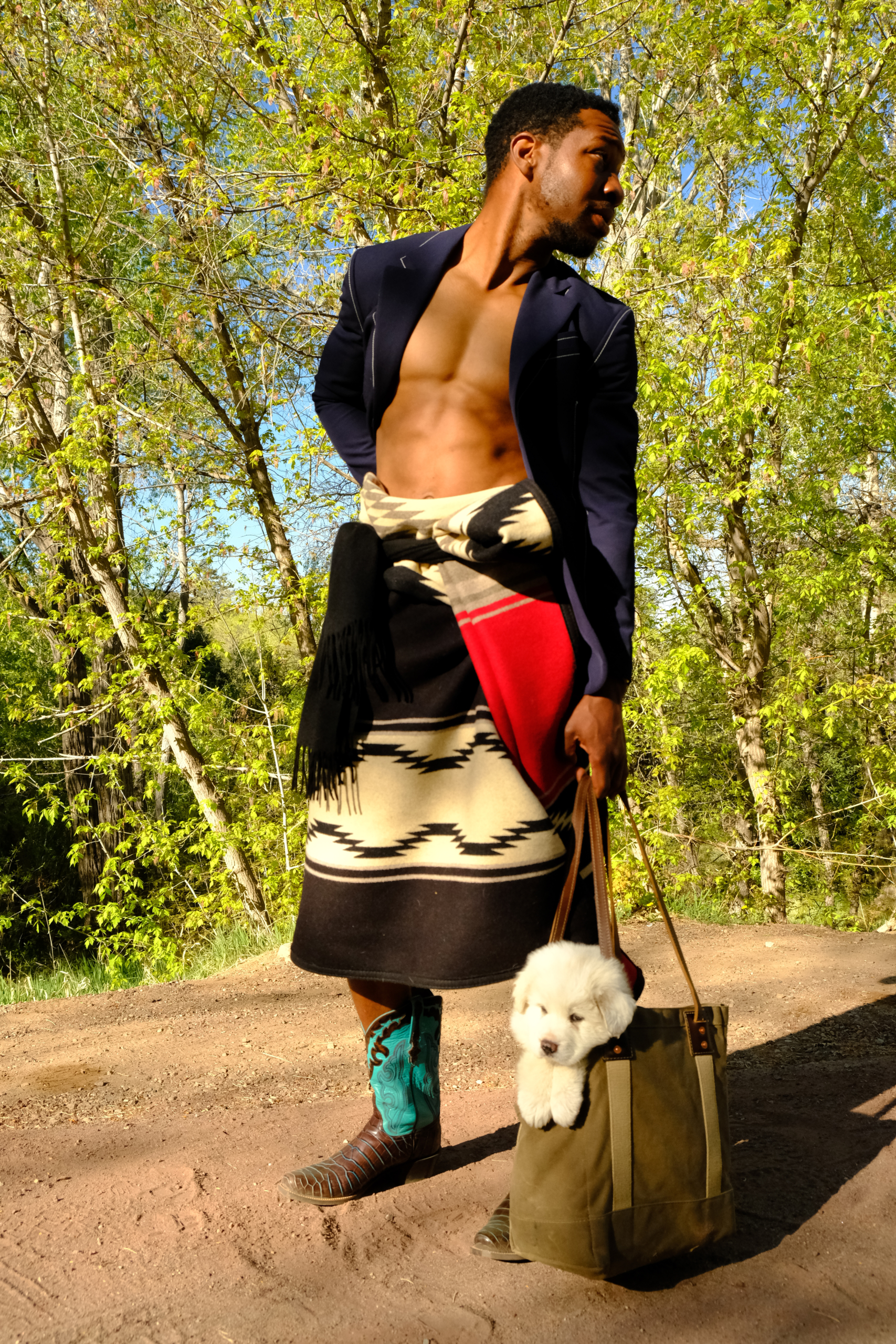
Jacket by LOUIS VUITTON MEN’S. Skirt and Shoes JONATHAN’S OWN. Jonathan’s Own Lucchese Boots.
McCONAUGHEY: Instead of people seeing that as a contradiction, that’s actually the beautiful paradox. You come from somewhere. You got things you represent. You’re committed to yourself. You got commitments to people in your life who have fed you and watered your garden. But at the same time, you’re your own man. There’s only one Jonathan Majors, and you give a damn about Jonathan Majors.
MAJORS: That’s the contribution, isn’t it? How can I contribute in my way, where I put my energy forward, put my ancestry forward, and add that to the pot? We talk about America as a melting pot, where you can’t turn salt into pepper. Then you got too much pepper. You need the salt. You need the paprika. You need the broth. What you told me at the White Boy Rick opening night party, I literally took that to set two days later for another film. I took everything you said and put it to work on set. I can learn from you, but at the end of the day, you gotta do it your way. Otherwise, we cannot move forward.
McCONAUGHEY: I shared something with you that you took. But once you took it, it became yours.
MAJORS: Yes, sir.
McCONAUGHEY: So once again, there’s another way of having more blue ribbons. I don’t own what I share with you. I only own it for me.
MAJORS: Each one teach one. That’s the whole thing, right?
McCONAUGHEY: Who wants to hoard good structural approaches to craft and life? I don’t know why anyone would want to hoard that and not share that. I think it goes back to what you were saying. Some people feel like if they do share it, then they lose it, but that’s false. It actually multiples.
MAJORS: That’s a line in the movie. “Bloods don’t die, we multiply.”
McCONAUGHEY: Yes, it is. Something I appreciate about you and your work is your ownership. I see it in your body language as an actor, in Da 5 Bloods, how you sat across the table from the young French lady, how you held your position, you didn’t trespass, how you settled in the boat and took three steps to get closer to Clarke Peters, leaning in over his shoulder, how you moved across the room when you showed up from Vietnam to surprise your dad. Already without saying a word, I saw a man who has ownership of himself, of his space. Those are choices you’re making, right?
MAJORS: Yeah. You can’t hide. When the camera’s up, it’s very important that we put forward the truth and give an example of how you want to live. And you’ve got to take up your space. That was our conflict in White Boy Rick, right? I was moving in on your son, and then you were trying to take up space. Now we’ve got a film. Now we’ve got problems.
McCONAUGHEY: Now we got dynamic.
MAJORS: Now we got dynamic. And so, it’s a gift that I try to give myself, because I want to tell the truth, and it’s a gift that I try to give the other actor to say, “There’s something here to deal with.” Because there ain’t nothing worse than getting into a scene with somebody and they’re not holding their own, they’re not present. And if someone has a big presence, you want all that presence. Then you don’t have to act. You’re just dealing with what’s in front of you. And I was lucky enough to have Clarke Peters and Delroy Lindo, other fellas who do take up space and who aren’t afraid of conflict, conversation, or discourse, which is spark. It’s very humbling that you felt that.
McCONAUGHEY: If you can own your own space, then you have greater obstacles to overcome in a scene. You own your space, and your father, played by Delroy Lindo, is surprised to see you and doesn’t want to see you. You got a confrontation there. Now we’re coming to life. There’s another great adage that I love: “Without confrontation, you can’t have unity.”
MAJORS: That speaks to many things.
McCONAUGHEY: Which goes back to where we began our conversation with the world today.
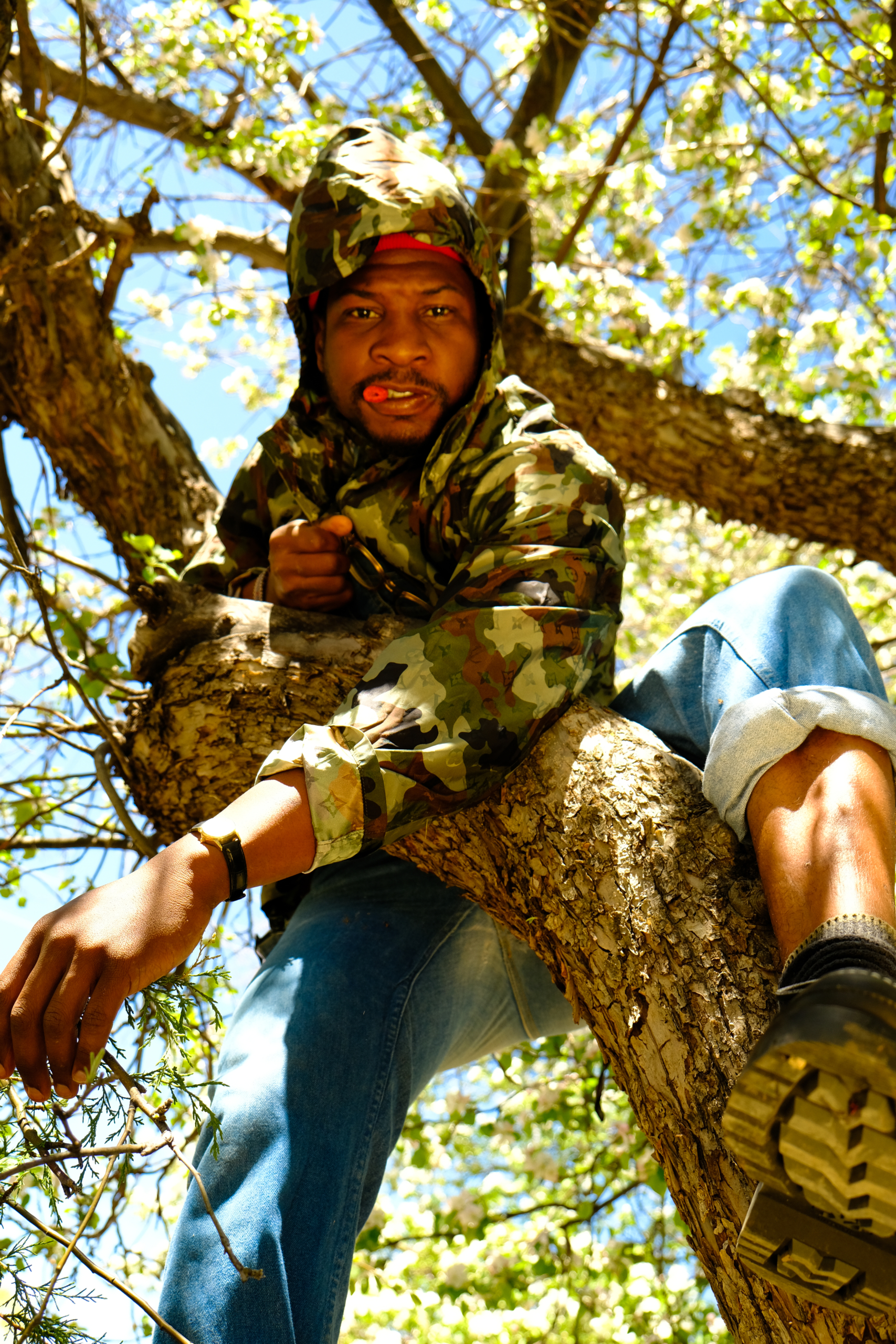
Jacket by LOUIS VUITTON MEN’S. Pants, Bracelet, Socks and Shoes JONATHAN’S OWN.
MAJORS: I spent some time in juvenile detention, and as far as owning space, I may have owned too much space as a young boy, and it got me in trouble. But through that, I found some unity. I found acting, and that’s become a place to exercise that. Conflict is not bad if everyone’s present and you can see the other fella. I was a boxer, and you can’t just get in there and swing. You got to know who you’re dealing with. And it’s just a match. We’re on the mat trying to score points, and when it’s done, it’s done. And in that expense of physical effort, you’ve grown. That’s the reason why we hug each other at the end, we dap up. You love your enemy, because you’ve experienced so much with them, and you’ve learned so much about yourself with them. And if you’ve done it right, you have an alliance, you have a treaty, usually a peace treaty: “We’ve worked this out now. This is how it’s going to go from here on out.” And that works. That was the Civil Rights Movement. People went to war. That happened. It was a war of spirit, and two spirits went at each other. And at the end of it, we had an alliance.
McCONAUGHEY: At the same time we’re talking about acting, we’re talking about life and present events. But you got to come to the table from opposite sides of the table. We need to meet on our front porch together and have differences of opinion, and we need to be more honest about it. Like you said earlier, you’re not trying to win the argument. You’re trying to get it to where you both get up from the table saying, “We got a better idea together. I understand your side of the story, and you understand my side of the story, and we understand each other better.”
MAJORS: There it is.
McCONAUGHEY: That’s where I think we find a slipstream in a honey hole, just celebrating our differences, not homogenizing our similarities.
MAJORS: What I hear from that is one plus one is three, which I think about all the time.
McCONAUGHEY: Bingo!
MAJORS: If we get together and really work it out, it’s three.
McCONAUGHEY: And on the other side, one plus one is one.
MAJORS: There it is! That’s the cool part about what we do. You make something, and then the audience gets to see it regardless of what it is. They’re the other one. And what everyone takes away from it is three. Spike does that big time in Da 5 Bloods. The one that we’re bringing forward to the table is a story no one’s ever seen before. We’ve not talked about black veterans, and if we have, it’s been for five pages. It’s in the story, but it’s not a part of the story. It’s the appendix, a footnote. But to tell a story like Da 5 Bloods and show these men and only these men within this context, to see what these men have done, what their experience was as black soldiers in Vietnam, and then to also get the other perspective of them coming back after being Americanized again after the war, to bring that to the table and examine that, I wonder what the three will be, what the film plus the world will equal, especially in a time like this. Spike and I have been texting back and forth every now and then. I wrote, “It’s on,” and he said, “Like hot buttered popcorn.” And it is. We’re about to bring something to the table.
McCONAUGHEY: I watched it last night, and it had a lot to say, and it is on like buttered popcorn. Spike takes a lot of really fun risks with how he breaks the mold in his filmmaking. There are three acts to a movie, and there are three acts to our experience of making it. You have the expectation going in, the actual experience of making it, and then you have the third act, which is the product that we see on the screen. How did that evolve for you with this movie and with working with Spike, and how was it similar, and how was it different, that journey from what you expected, to what the actual experience was, to what the final result was?
MAJORS: The first act is kind of common. It’s like, “All right, I’m about to do this film.” This film was my first proper offer.
McCONAUGHEY: As in no audition?
MAJORS: No audition. Just, “Spike wants to meet you.” I’m living in Harlem at the time. I said, “Spike Lee wants to meet me? Okay. Sure.” And sure enough, he called said, “Mr. Majors.” And I said, “Mr. Lee.” He said, “Call me Spike.” I said, “Cool.” He said, “Come down to the office.” I said, “Okay.” He said, “Tonight.” I hopped on my bike, I rode down, and we just chatted for a bit. He showed me some stuff he was working on. He plays this video, and me being me, I just start crying watching this thing. It’s about the border wall, and it’s backtracked by a Red Hot Chili Peppers song. He looks over at me and goes, “You like that, huh?” And I go, “Yeah, it’s alright.” And then we step outside, and it’s on. He says, “This is who you’re playing. Do you have a passport? Read this book.” I read the book. It’s called Blood. Before I left, he showed me the scouting book, all the places we were going to shoot, and then he said, “You know Delroy Lindo?” I said, “Yes, sir, I do.” He said, “That’s your dad.” I said, “Okay.” He said, “You got the script?” I said, “Not the recent one.” He said, “I’m going to send you the other one.” I read it, texted him back that next morning, and that was that. Then when we got there, and it was straight-up rock and roll. There were no sound stages. There was none of that shit. We were in the elements, climbing up the mountain, sweating, fighting mosquitoes. That type of energy, I did not expect off the top. I thought, “It’s going to be political. It’s going to be sad.” I didn’t think it was going to be so visceral.
And now, in our third act, I’m just amazed by the relevance of it, how important it is to tell this story. You don’t sign on to something if you think it’s bullshit. They came around to me to audition for BlacKkKlansman, and I read on it, I prayed on it, and I thought, “I don’t know if this one’s for me.” BlacKkKlansman is extremely relevant and he did damn well with it, but with this one, I said, “As a young black man, I see the relevance and the urgency in this.”
McCONAUGHEY: You saw that early on?
MAJORS: I saw that early on. My father is an Air Force veteran, and my two grandfathers, one fought in World War II, and the other one fought in both the Korean War and in the Vietnam War. That’s in my DNA. And I thought, “Wow, this is in a way my grandfathers’ story.” So for me, there’s a deep attachment to these men and what they’ve done, the black Vietnam war vets.
McCONAUGHEY: In that second act, when you’re there, you show up, and it’s like, “We’re live. We’re not on stage. The weather’s what it is. I gotta stay hydrated. Mosquitoes bite. We’re in this.” You’re tired. You’ve been with the same guys every day for the past two weeks. Everyone’s in the same shit. Do you find that you have to do less acting? It’s like, press record. It’s live!
MAJORS: Shoot the rehearsal! Let’s go! I felt that, and doubled down on it, because I got into the habit the first day of running to set. My character David was a track star at Morehouse. So I’m like, “Okay, that’s information. That’s research. I’m going to run to set, I’m going to run back, I’m going to run to lunch.” And that became a part of it. David has a very high frequency. It’s all about making his dad proud. And I was trying to make Delroy proud, and I was trying to make Spike proud.
McCONAUGHEY: Bingo.
MAJORS: “Let me be a part of your legacy. I’m going to earn my spot here.” That’s what I was feeling, and that’s what David’s feeling.
McCONAUGHEY: You just explained what we do when we act well. You make it all personal, not to the character, but to Jonathan. I got to make it personal to me, Matthew, in the context of the character. And then you’re going, “Now I’m not acting.” I’m not playing a part, per se. I’m tapping into that part.
MAJORS: I’ll tell you something, because we’re just talking shit. My biological father, he and I have a very tough relationship. He kind of disappeared when I was coming up, and then he kind of came back. I haven’t heard my father’s voice in about four years now. And there’s something about what’s happening, or what I’ve experienced on Da 5 Bloods, that relationship between father and son, which also happens with Atticus in Lovecraft Country, that search for his father. Today, after my workout at the park, my father called me. And I said, “You know what? I gotta pick this up.” I haven’t spoken to him in about four years. He’ll call my brother and sister, but something in me said, “Today, I’m going to pick this phone up.” And I spoke to him. It wasn’t about shit, but if it wasn’t for the experience, the healing that David deals with, and the work that Atticus goes through, I don’t know if I would’ve picked the phone up for my dad. But there’s something about where I am as a man now that said I have to do that, because I’ve already done it on screen. It was personal. So I was walking down this road, and my father called, and I said, “Today’s the day. I’m going to talk to this man and see what’s what.” It wasn’t emotional. It was straight to the point. “How you doing, Dad?” “I’m good. How you doing, son?” “I’m all right.” “You staying safe?” “I’m staying safe.” He said, “Be careful. These white folks crazy.” I said, “Yeah, I hear that. You be careful, too.” “I love you.” “I love you, too. Bye.”
McCONAUGHEY: How cool is that, man. This is something else I noticed that I see in your work that I appreciate. I’ll read you what I wrote down when I was collecting my thoughts, because it actually ended up rhyming: “Jonathan Majors, he shines by holding the line. He don’t overdo it and chase Lanya, or moments, or Spam. Never at the expense of enduring the truth of being your man.”
MAJORS: Bro, that’s a poem.
McCONAUGHEY: You know what I’m talking about?
MAJORS: Oh man, come on. Breaks my heart.
McCONAUGHEY: Let’s go back to one of the first comments I remember I said to you. You and I have laughed our asses off about this. In White Boy Rick, you threw out the title of the movie under your breath, over your shoulder. That’s when I was like, “Yes!” Because so many of us actors go, “Oh, my gosh. I can’t help but realize that I get to say the title of the movie!” And I’ve seen actors do it. They set it up. They’re going to turn their head straight to camera, and they’re going to get themselves a trailer moment, because they’re going to say the title of the movie straight down the pipe. That would be soliciting, as I said earlier. That’s the “Lanya.” That’s putting a little spin of cherry on top of the cream. That’s the Spam instead of the ham at the expense of an enduring hold-the-line truth of knowing and taking care of truth for your man. You have a long money view, not a short money view.
MAJORS: I’d say a lot of us are going short when we should be going long.
McCONAUGHEY: So long! Come on now! Trust yourself! Take a few hickeys along the way, but dang, it feels a lot better once you get the kiss later.
MAJORS: That’s right. They done messed up by putting us on the phone together. It’s crazy.
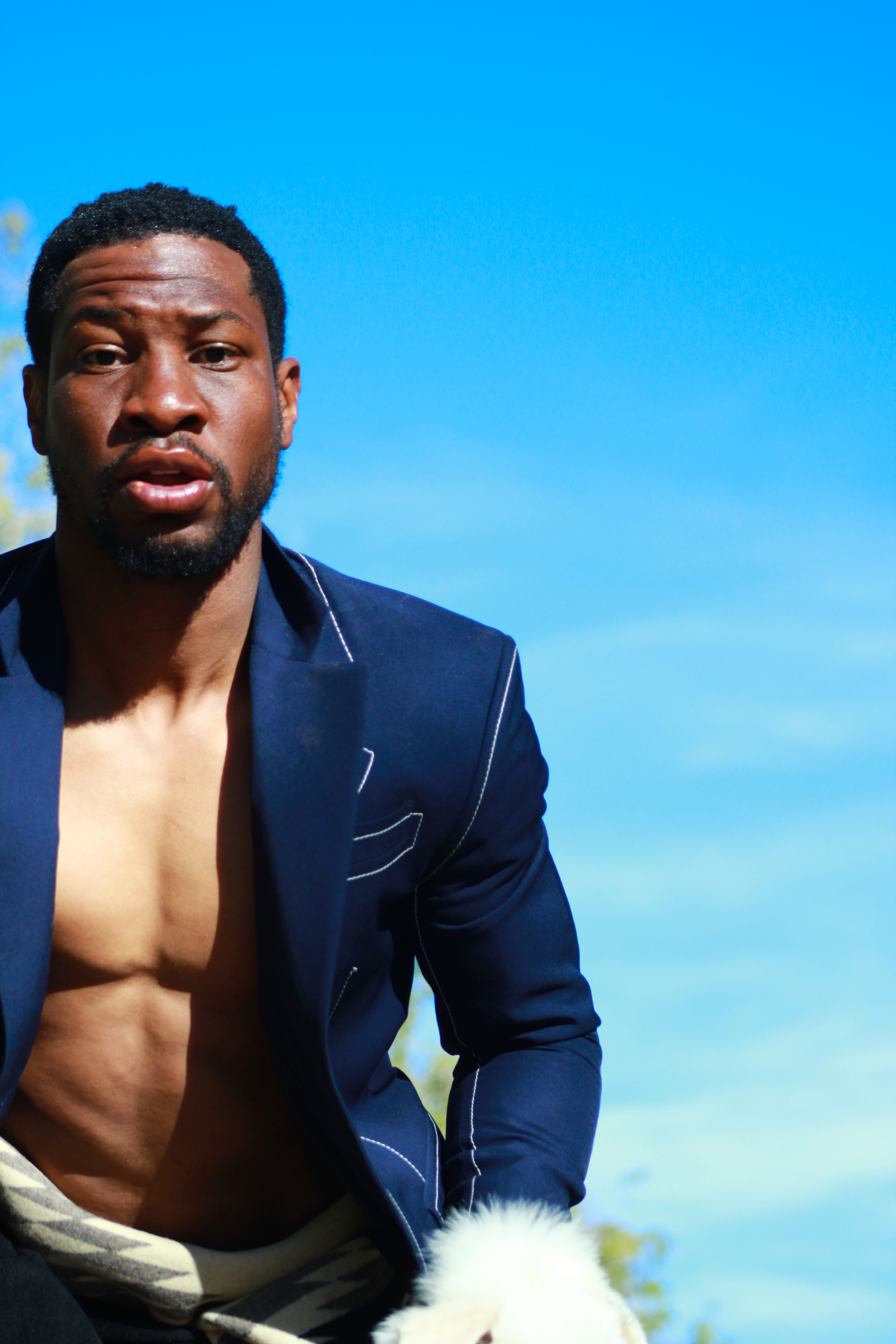
Jacket by LOUIS VUITTON MEN’S. Skirt, Bag and Shoes JONATHAN’S OWN.
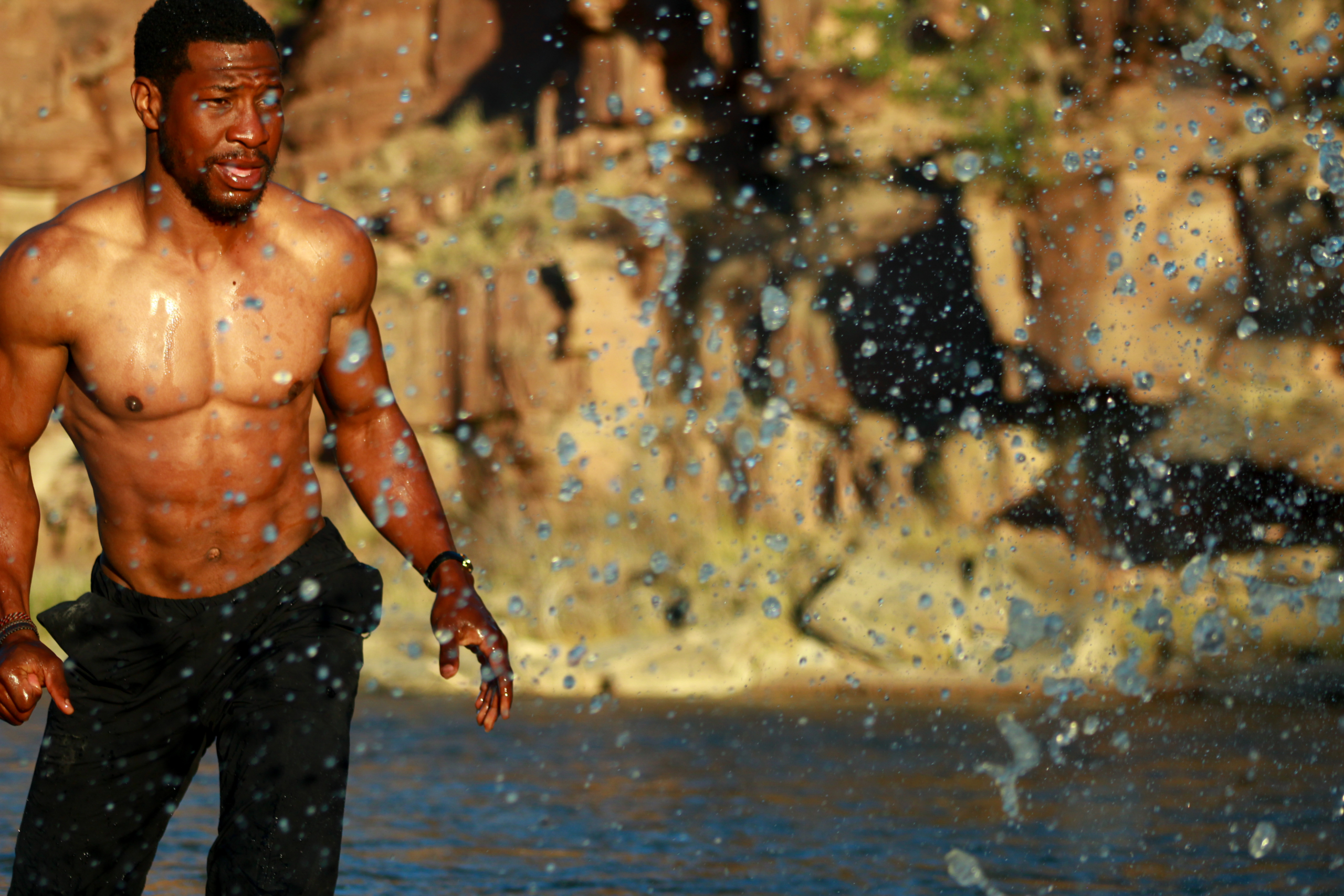
Pants by LOUIS VUITTON MEN’S. Bracelets JONATHAN’S OWN.


